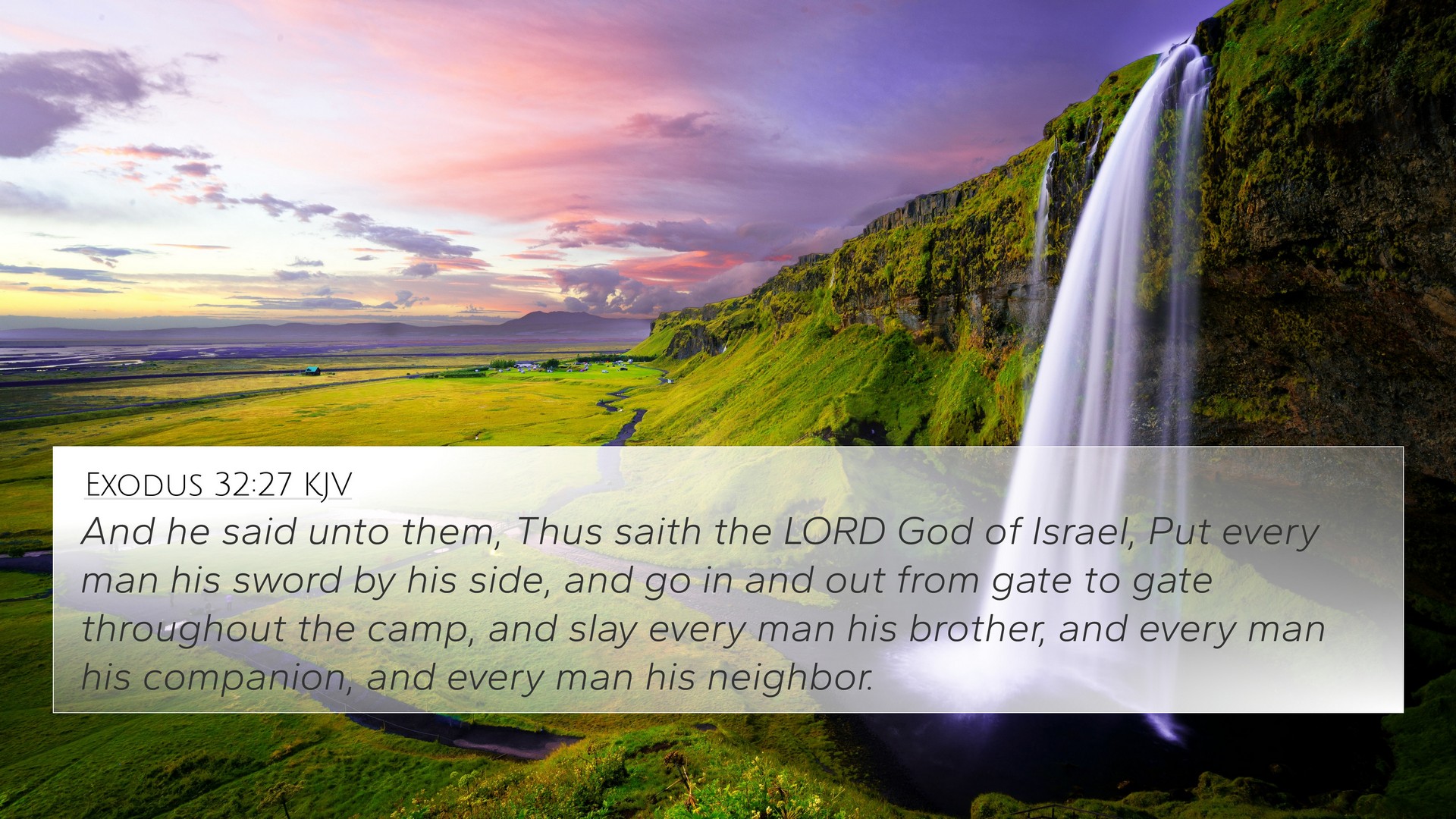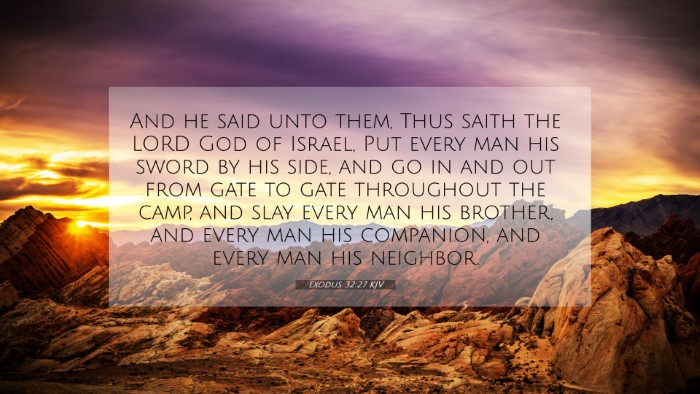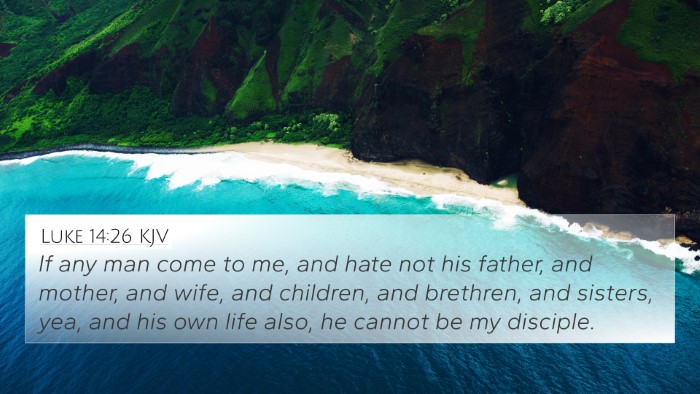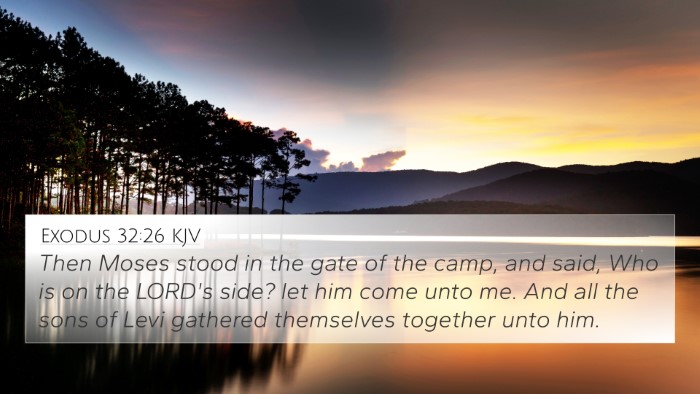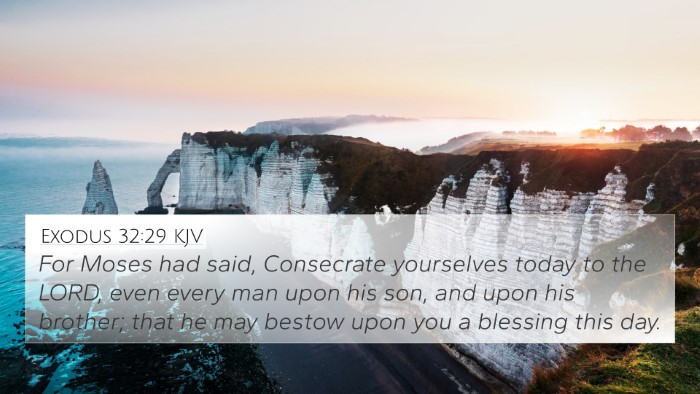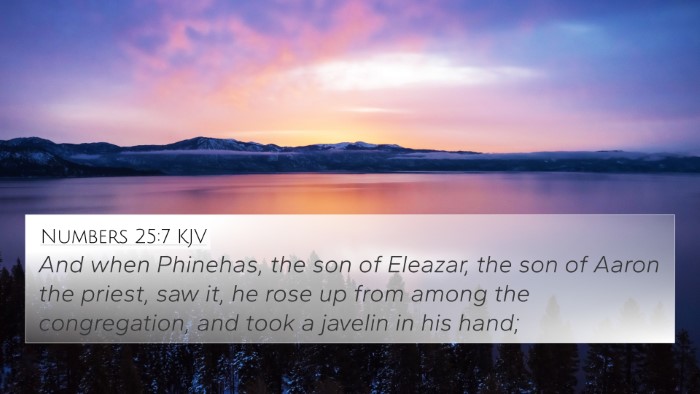Understanding Exodus 32:27
Exodus 32:27 is a pivotal verse in the narrative of the Israelites' journey through the wilderness, reflecting on themes of obedience, judgment, and the seriousness of sin. It provides crucial insights that connect to various other biblical texts, enhancing our understanding through cross-references.
Verse Context
This verse occurs in the broader story of the Golden Calf, where Moses descends from Mount Sinai to find the people engaged in idolatry. Here, Moses, as instructed by God, commands the Levites to execute judgment among the people.
Key Themes
- Judgment for Sin: The Levites are called to carry out a severe judgment as a consequence of sin (Exodus 32:27).
- Obedience to God: The Levites’ willingness to obey Moses' command signifies their loyalty to Yahweh amidst widespread rebellion.
- God’s Holiness: This act demonstrates the seriousness of disobedience and the holiness of God, as He cannot allow sin to go unpunished.
Commentary Insights
According to Matthew Henry, this verse showcases the gravity of turning away from God's commandments and highlights the consequences that follow. He emphasizes that the punishment reflects not only God's judgment but also His desire for purity among His people. Albert Barnes notes that the call to arms by Moses symbolizes a serious need for accountability within the community of Israel, while Adam Clarke interprets the actions of the Levites as an important act of zeal for the Lord, which signifies their commitment to God over familial or societal ties.
Cross-References
Exodus 32:27 has several related verses that enhance its meaning through inter-biblical dialogue:
- Numbers 25:5: Demonstrates similar themes of judgment for sin among the Israelites.
- 1 Peter 4:17: Highlights God's judgment beginning at His house, connecting to how God holds His people accountable.
- Deuteronomy 13:9: Illustrates the severe consequences for idolatry within the community.
- Hebrews 10:31: Emphasizes the fearful nature of falling into the hands of the living God when one disobeys his commands.
- Romans 6:23: Addresses the wages of sin, which correlates with the outcome of the actions taken in Exodus 32.
- Matthew 10:34-36: Jesus speaks to the division that might occur when one chooses to follow Him, similar to the division seen with the Levites.
- Galatians 6:7: Paul reiterates the principle of sowing and reaping, aligning with the consequences of the Israelites' disobedience.
Connections and Insights
This verse connects profoundly with the overarching narrative of redemption found throughout the Bible. Its analysis emphasizes the importance of consistent themes like obedience, judgment, and God's unwavering holiness. Here are some insightful parallels and thematic connections:
- Linking Old and New Testaments: The theme of divine judgment for sin permeates both testaments, showcasing God’s unchanging nature.
- Thematic Bible verse connections: The call for the Levites to act reflects a divine pattern seen in both the Old and New Testaments concerning the seriousness of sin.
- Inter-Biblical dialogue: The stern response to idolatry in Exodus echoes in the New Testament condemnation of idolatry (1 Corinthians 10:14).
- Cross-referencing themes: Both Exodus 32:27 and the teachings of Paul in the epistles highlight accountability within the church and community of believers.
Conclusion
The study of Exodus 32:27 allows for a deep dive into themes that resonate throughout the Scriptures. Utilizing a cross-reference approach not only enriches our understanding but also enhances our appreciation for the interconnectedness of biblical texts. Tools for Bible cross-referencing such as a Bible concordance or a cross-reference Bible study guide can assist readers in exploring these connections thoroughly.
Reflective Questions
- How does the judgment in Exodus 32 apply to our lives today?
- In what ways can we demonstrate obedience and zeal for God like the Levites?
- What can we learn from the consequences faced by the Israelites regarding idolatry?
Further Study
For those interested in deeper study, consider:
- Using a comprehensive Bible cross-reference system to map similar themes across various scriptures.
- Engaging in cross-referencing Bible study methods to better understand the implications of obeying God’s commands.
